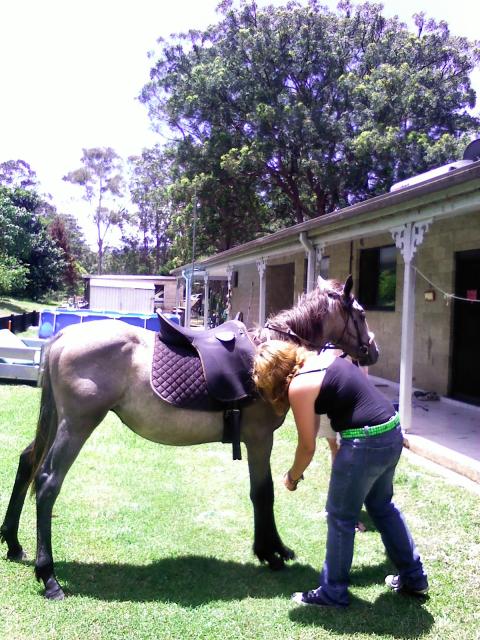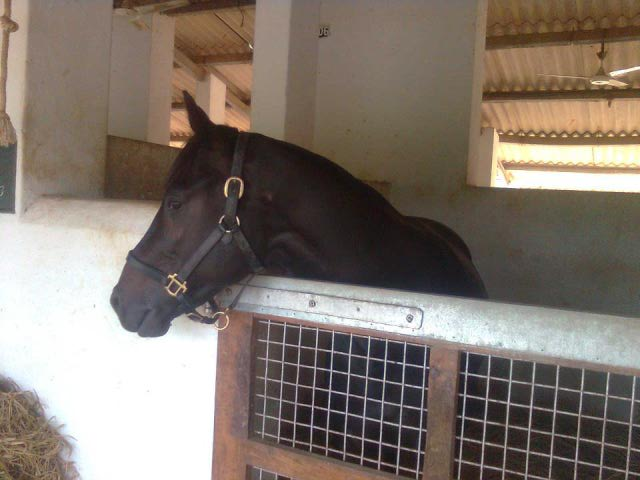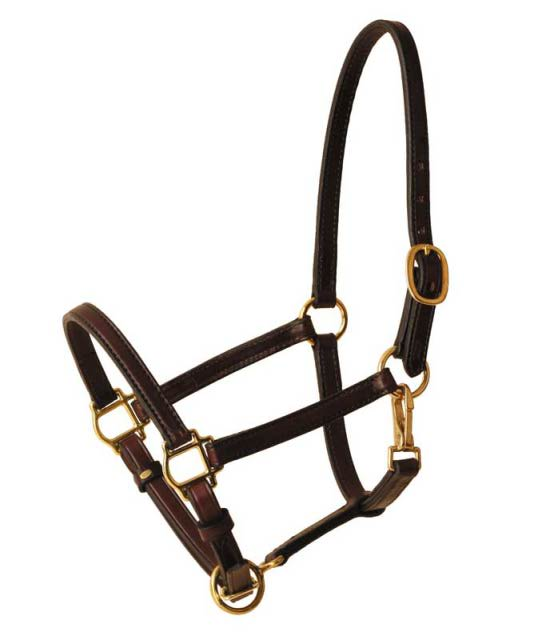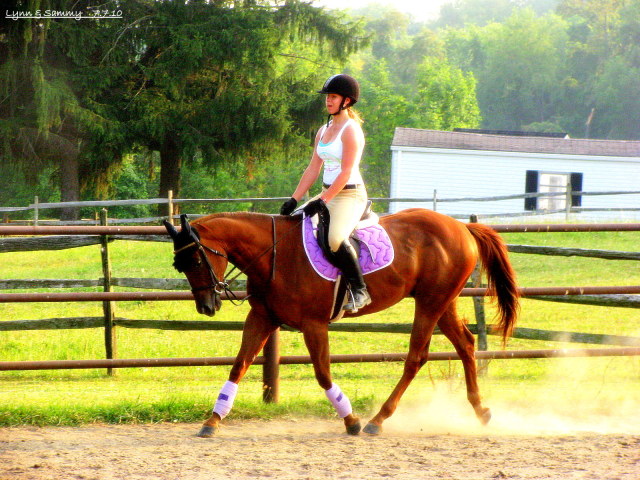QuestionDenise - I actually started to cry when I found your website --guess I was just so happy to find someone who might be able to help me. I live in Florida and just purchased a horse from Oregon. I did lots of homework, saw lots of horses and I traveled out there to meet him, ride him and see what he could do. He is an 8 year old Hanoverian/Arabian. "Grant" was bred and raised by the woman I purchased him from. She is a very gentle and natural horseperson. I was impressed by her training and his calm manner and intelligence. He loves people and is very sociable - follows people around, "bows" for treats, etc. He is very responsive under saddle - trained primarily in dressage and I planned on showing him just for fun. He lunges beautifully and jumps on the lung line -I also wanted to jump with him. She had done some desensitizing and had just taught him to walk over a plastic tarp before I got out there. Grant arrived via trailer and seemed to settle in. He was nervous on the cross ties but we worked through that. I lunged him the 3rd day after he arrived and rode him in the ring the next day. He seemed a little nervous at times but fine. After about 10 days I took him on a trail ride -- he got on the trailer fine with a little hesitation. I took him to the beach with a friend and her very calm trail horse. I know he had never seen the ocean before but it was open and we went nowhere near the water. He was a nervous wreck. I walked him for over 30 minutes but he never settled down. He would not stand still and was jumpy about everything - I was barely able to mount him but I did and he was a little easier to control but still ridiculously nervous. For the next 2 weeks, I rode him at the barn and practiced in the ring. I have noticed that he is jumpy and nervous about the smallest things. Yesterday my friend, her horse and I took him to an equestrian neighborhood. (He has now been here for more than 3 weeks.) It is a very open area - no closed trails and we rode in the neighborhood riding arena. It was completely quiet out there. He was a complete nervous wreck during the entire ride. He jumps and spooks at everything even the poles in the riding rink. Here is what he does: his head is up and nostrils flared, his skin "twitches," a few times he shakes his whole body like he is drying off, he kicks out his back feet like he is kicking flies and generally acts like bugs are biting him. I talk to him and pet him but I can't get him to relax. I took this trail ride because I figured the beach was too much of a stretch. I also figured this would be more like going to a show. But he was even nervous in the arena. I am so discouraged - I bought a horse that I thought was well trained and level headed and his general demeanor/personality is so contrary to this. It is not pleasureable to ride an animal that is so nervous. Furthermore, I certainly do not want to jump with a nervous horse. Is this an issue of desensitizing him, him learning to trust me or is it a personality problem? What can I do to fix this problem. He is very smart and very willing to please. HELP! THANK YOU SO MUCH FOR YOUR TIME!!
AnswerHi Kim!
I can feel your frustration from here. You need a hug! Hang on, you can get this fixed up. The horse you first met is in there, you will just have to re-establish a relationship that is unique to the two of you.
You will have to become the leader that Grant can trust and believe in. You know that it took 8 years for his first owner to develop the relationship you saw when you bought Grant. Your horses world has just been turned upside down! He has to find out who he is again, build trust, confidence and support. He is just not able to take care of you right now, he is to consumed with taking care of himself. You will have to do the majority of the heavy lifting for a while. It will be your responsibility to prove to him that you are a leader he can trust and that you do have the answers.
Some of the behavior you are describing is a result of gaps in Grants education. Often times horses are treated like very gifted children that someone has sent off to college without giving them the benefit of a good, solid grammar school education. This also happens to us as riders. We learn how to ride the horse but never learn the basics of colt starting or basic horsemanship. Lessons consist of upper level movements and exercises without ever learning what it takes to get to the horses mind or how to deal with horse behavior that we incorrectly term as "bad" behavior. Grant is just being a horse. His is not bad he just does not know what to do with his energy and you are not sure how to support him. Lets get busy with some answers...here goes:
I would go back and re-start this horse like a colt. In so doing, you are getting an accurate assessment of his basic skill set. You will also be exposing the gaps in your own equine education and what it takes to teach, lead and support your horse in a way that creates relaxation and confidence in BOTH of you. Start first in the round pen by hooking your horse on. This is the first step it developing respect and trust. You send your horse out with energy and at the first second that he tries to look you up, release the pressure. Your goal here is to have him face up on you. This is the horses way of recognizing you as the leader and asking you what he should do next. I want you to be able to send your horse out and draw him in to you based on your body language. He will also need to learn how to yield his hind quarters, and then leaving his hinds in one place, walk the fronts around to change direction. Then using just your body position and your "presence", send your horse back. All of these things are the first layer of education that your are building in your horse. You will be building this on in layers. You will use the same movements at liberty, then with the lass rope, then the halter and finally under saddle. It is like building an onion up from the core. When you build on in layers, these movements become second nature to the horse, something that he can rely on when he starts to become worried or scared. The most important place to start is getting to the hind feet. This is the engine of the horse. By teaching him to yield the hind quarters your are building in the emergency brake and a way to control the life and energy in his body without making him feel trapped and triggering a panic response. We build in layers starting at liberty because it is a pure way to teach the horse. We cannot force the experience, we simply fix things up for the horse to find the answer. In this way the answer truly means something to the horse, they understand. There is no room for force in the horses mind. We just have to keep fixing and allow our idea to become his idea. For example, if your ground work is good and you are out on the beach and you FEEL Grant starting to become worried, you simply begin bending him, yielding his hind quarters until you feel him turn loose, let down, and relax. Depending on how bothered he is this may take a while. You may only get to take a step or two forward before you need to be bending again and really getting to his feet. However, once you prove to him that he can continue to move in a meaningful way and survive the scary situation with your support, you will see him lick and chew, maybe even yawn, all signs of letting down and understanding. I have written some pretty extensive answers on exactly how to work on hind quarters. If you wouldn't mind looking those up and reading them, I can continue to present more information to you in this answer. If you have specific questions about the movements, let me know and we can cover those in detail. So, number one on your list is HIND QUARTERS, at liberty, from the lass rope, from the rope halter (good halter with a 12' tree line lead), and finally from the saddle. I'm also going to suggest some DVD's for you to watch and some reading that clearly illustrates these movements! Yup, HOMEWORK! :) I just need to add one thing here and that is, at any time you are not feeling that you can support your horse and ride through the difficulty...get on the ground and get to work! It is much better for you and your horse to work through these issues from a place of confidence rather than having you be scared that you may come off!
How much turn out time is Grant getting? I'm hoping he spends the majority of his time out on pasture. It seems to me that he has a lot of pent up energy. Making sure he is getting plenty of pasture time is vital to the physiological and psychological well being of the horse. Being aware of what happens before what happens, happens will help you so much with this horse. He is young, strong and really needs a JOB! I would do all of my ground work with him and make sure he is mentally ready for a ride before I ever hopped on! This does NOT mean lunging! The lunge line does NOTHING for the horses mind. It only conditions them to run longer, creates a brace and causes the horse to counter bend! I do not lunge my horses. I would start every ride with extensive ground work (see Buck Brannaman's "Ground Work" book) prior to mounting. This would mean using my flag to make sure he was confident about the unknown. I use may flag every day with all of my horses. I use it thousands of times. It really changes a horse and the way they think about the unexpected. I helps with changing of eyes, I have a slide show of this on my website. Never make your horse stand still when using a flag. The horse must be comfortable with the flag both standing still and moving. If your horse cannot stand relaxed, yield his hind quarters while exposing him to the flag and wait for his feet to come still. Never do so much that your horse feels he can't win. Stay on the edge of trouble. But, do go to the edge! Show your horse he can survive, expose and retreat!
Kim, this is just a start, but these simple things will make a world of difference for you and your horse. I would like for you to watch the DVD "Ground Work" by Buck Brannaman. It is very clear and easy to watch. Take a look at Buck's Ground Work book as well. It does not matter what the horse will do later in life the things you will see in the book and DVD IS the grammar school education that every horse must have to become a successful dressage horse, jumper, three-day horse, cow horse, or trail horse. Read some of my past answers as well on colt starting, changing of eyes, ground work. These are the things that will put you on the right track with Grant. These are the things that will give you the relationship that both of your are searching for. Give me a shout and I will clarify these concepts for you. I know it is a lot and it will leave your head swimming, but we will keep working at it until it is second nature for the both of you! Relax, this is a wonderful journey. By next year you will have some great skills. This is all part of becoming a student of the horse and developing as a horsewoman. Enjoy!
Smiles! Denise

 Breaking in and bad habbits
Question
Jasper- saddled
Hi, im 17 years old.i have a 2
Breaking in and bad habbits
Question
Jasper- saddled
Hi, im 17 years old.i have a 2
 trotting on the road
Question
road
hello. i am rohit from india. i ha
trotting on the road
Question
road
hello. i am rohit from india. i ha
 turning the face towards wall
Question
shy horse
hello maam, when i approache
turning the face towards wall
Question
shy horse
hello maam, when i approache
 halter
Questionhalter
QUESTION: hello sir, may i know w
halter
Questionhalter
QUESTION: hello sir, may i know w
 behavior problems
Question
troting sammy(:(:
i just bought a 5y/o chestnu
behavior problems
Question
troting sammy(:(:
i just bought a 5y/o chestnu